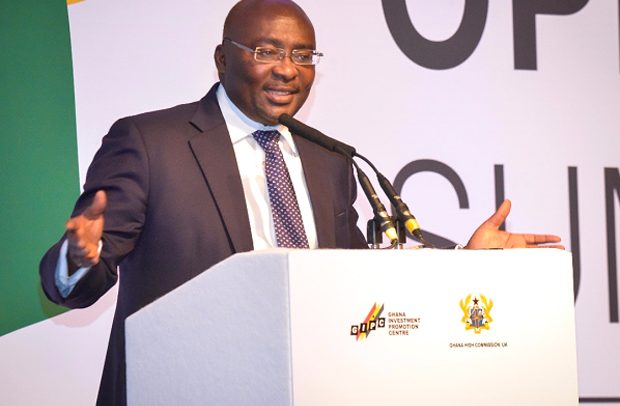Vice President Dr Mahamudu Bawumia
Managers of the country’s economy appear to have locked up the US dollar in the currency market once again.
The cedi came under considerable pressure from the dollar, trading at GH¢4.9 to a dollar a month ago.
This attracted criticisms against Vice President Dr Mahamudu Bawumia from his political opponents.
However, he explained at a National Policy Summit in Tamale that the economic fundamentals were strong and that the marginal depreciation was as a result of the rebound of the US economy.
In the last two weeks, the cedi has been appreciating against the dollar, as the interbank rates showed the local currency traded at GH¢4.7 to a dollar.
This is a major relief to businessmen who were spending additional 20 pesewas to buy a dollar.
The Vice President last month at the event explained that interest rates of the dollar had been increased by the Federal Reserve of USA, causing the dollar to appreciate, hence the depreciation of the cedi and other currencies around the globe.
“Even India, a very strong and vibrant economy, has had its currency depreciated to the dollar,” Dr. Bawumia pointed out.
He disclosed that the cedi had depreciated by 7 percent – the second lowest depreciation of the cedi since 2012.
Comparing the data from 2012 to 2018, he said the cedi recorded 17.5% in 2012, 14.6% in 2013, 31.3% in 2014, 15.6% in 2015, 9.6% in 2016 and 4.9% in 2017.
During his days in opposition, Dr Bawumia affirmed that “if the fundamentals of the economy are weak, the exchange rate will expose you.”
According to him, the growth of the economy, even under unfavourable conditions, has been possible because of its prudent management, with strong fiscal discipline.
He stated: “Government has put in place measures to transform the economy to provide good climates for the growth of businesses, especially in the private sector. Such measures include the cancellation of some 15 taxes, which has significantly boosted trade and businesses in the country, especially importations. For the first time in the history of Ghana, GDP growths have seen an increase in non-oil products.”
The Vice-President said the debt-to-GDP ratio has declined to 64 percent as of 2018 – the first of its kind since 2007.
“And the difference between the NDC and the NPP is this – while the NPP is borrowing, debt-to-GDP is falling, but the opposite is always the case with the NDC,” the Vice President added.
– MyNewsGh.com


